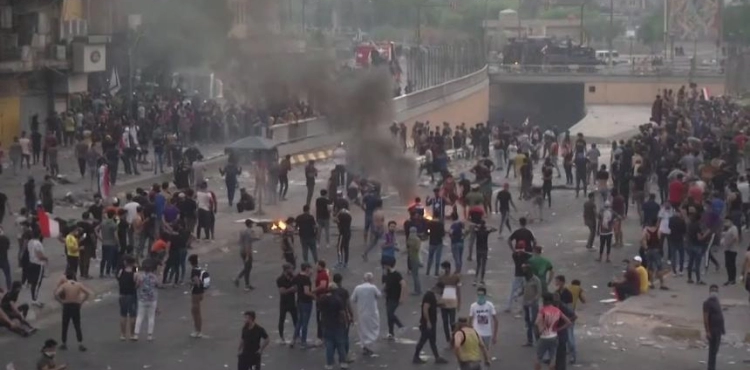The Iraqi government announced on Sunday a series of social measures in response to demonstrators´ demands, in an attempt to end popular protests in which about 100 people were killed in less than a week, according to official figures.
The United Nations called on Saturday to stop the violence, in the fifth day of spontaneous movement calling for the departure of the government accused of corruption.
At the end of an extraordinary session, the government of Adel Abdel-Mahdi, facing the biggest challenge since taking office a year ago, announced a resolution early Sunday on 17 social measures ranging from housing assistance and grants to unemployed youth.
The government also decided to build 100,000 homes. In September, local authorities in a number of areas began demolishing houses in informal neighborhoods where 3 million Iraqis built unlicensed buildings on state land.
In addition, the government has ordered the creation of "modern marketing complexes" in an effort to create jobs, especially among young people, 1 in 4 of whom are unemployed in Iraq.
Unemployment in the youth category is the first driver of the protest movement that began Tuesday, a sensitive issue in Iraq, where a young man burned himself in September in Kut (south) after his vehicle was confiscated for sale.
On Sunday, authorities accusing "saboteurs" and "unidentified gunmen" of infiltrators of demonstrators and security forces announced that they had registered the names of people killed since Tuesday in the violence on the list of "martyrs", which opens the door to compensation for their relatives.
At least 99 people have been killed since Tuesday and about 4,000 wounded, according to the UN High Commissioner for Human Rights in Iraq. The majority of the demonstrators killed were shot, according to medical sources had indicated Friday that six police officers have been killed since the beginning of the demonstrations.
On Sunday morning, the situation was calm on the streets of Baghdad.
During the violence, the headquarters of political parties have been vandalized and burnt, as Iraqis often disdain the ruling class in the country ranked 12th among the most corrupt countries in the world, according to Transparency International.
On Saturday, parliament speaker Mohammed al-Halbousi proposed a series of reforms to social justice, but the House of Representatives did not succeed in holding a session because of the lack of quorum after the boycott of several parliamentary blocs.
The protest movement sparked calls on social media, denouncing corruption, unemployment and declining public services in a country suffering from chronic electricity and drinking water shortages, and emerged at the end of 2017 after declaring "victory" over the Islamic State from nearly four decades of conflict.
This movement is mainly concentrated in Baghdad and the south of the country. Demonstrators present the spontaneous movement as "nonpartisan" compared to previous moves.
"These are anti-regime demonstrations," said Iraqi specialist Fener Haddad.
The authorities have asked the demonstrators to give them time to undertake reforms to improve the living conditions of 40 million Iraqis.












